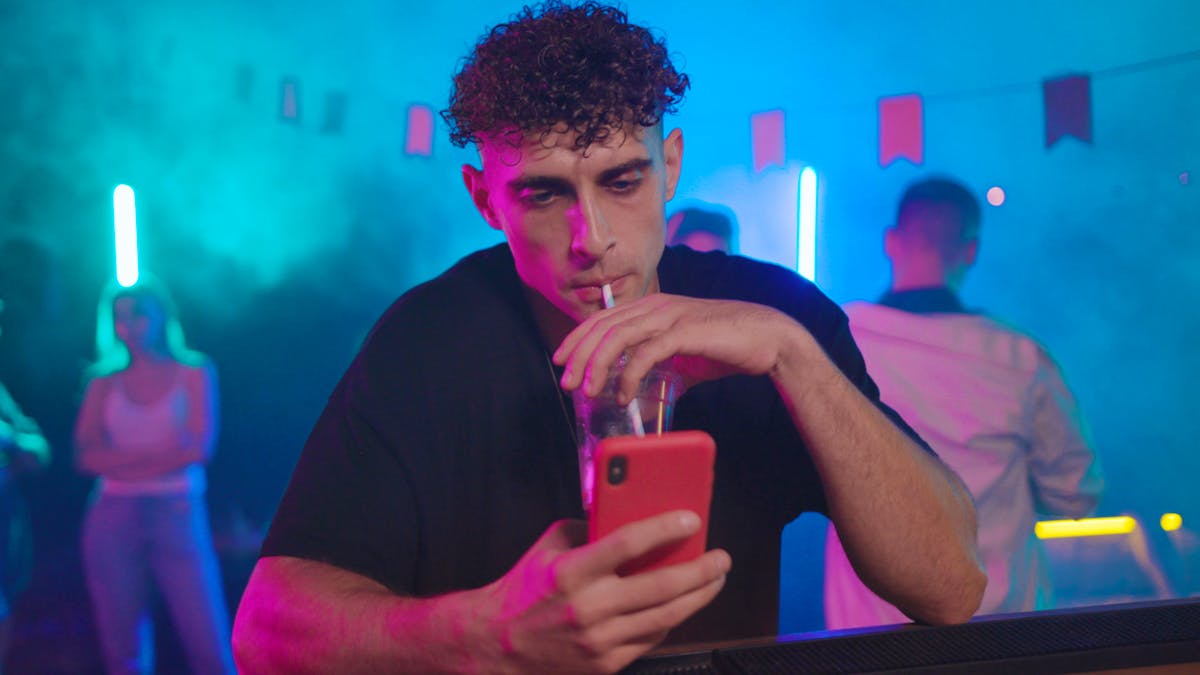“I gladly leave you!” I came for that, “said Laws Shafier, abandoning her phone at the entrance to an evening of the” Offline Club “in London. Here, no notification, no social networks, but meetings, in the real world.
Tickets are tearing out for these two -hour “digital detox”. In mid-February, the evening was once again full, with more than 150 people present, most young adults between 20 and 35 years old.
For this moment, without phone, they paid 9.50 pounds sterling (10.80 €).
“We are the generation of technology and social networks, but we have enough. We want to reconnect to the real world, ”explains Bianca Bolum, 25. This is the second time that this jewelry designer has participated in the evening. She came alone and hopes to meet other people.
More than 4 hours a day on your smartphone
According to the media regulator ofcom, the British between 25 and 34 years old spend an average of 4 h 03 per day on their smartphone.
Liliann Delacruz, 22, explains devoting ten hours to it, to exchange with his family, his friends, surf on social networks. “I’m here to get out of my bubble,” says this student.
On the tables, around which the participants settle down, are placed board games, painting. A hubbub rises in the room, a church that serves as a neighborhood room, while discussions come alive.
“Having left my phone is liberating,” said Harry Stead, a 25 -year -old engineer. “Too often, I feel the need to look at it.” He talks about his “Fomo” (“Fear of Missing Out”), his fear of missing something.
“Loneliness epidemic”
Shafier laws says he is completely “addicted” to his phone and “hates” this. This 35 -year -old executive assistant came with a friend with whom she exchanges while sewing.
If she was at home, “for sure”, she would have her phone very close to her. Besides, as soon as the evening ends, it turns it on quickly and remains its eyes riveted on the screen.
The irony is that the participants experienced the existence of this club on social networks, often Instagram.
“I am not against technology. I am not saying: “Get rid of your phones!” “Explains Ben Hounsell, the founder of the club in London. But “many people realize that keeping your phone away for a few hours doing them good,” said the 23 -year -old.
Since the club’s launch at the end of October, more than 2,000 people have participated. “It grows very quickly,” he says. The club also opened in Paris, Barcelona, Dubai. The first was created a year ago in Amsterdam a year ago by Ilya Kneppelhout and two friends.
For him, there is indeed “an addiction” to smartphone and social networks. “We use it even if we know that it does not do us good.”
The “offline club” also responds to “an epidemic of loneliness”. “People are looking for an authentic connection with other people, far from screens.”
“Take control”
Ilya Kneppelhout was inspired by reading clubs, such as Reading Rhythms in New York or the Silent Book Club, where people come together to read together. To disconnect from his phone for several days, there are pensions in many countries.
Influencers have tried to lift their foots themselves. The French Léna Mahfouf told mid-November her “month without screen” to her millions of subscribers.
Venetia la Manna, activist on social networks for fair fashion, disconnects every weekend and makes it known with the word tie #offline48. I am more present with my loved ones. I sleep better. I am more creative, ”she explains to AFP.
For most people, smartphone and social networks “do not harm mental health”, says Anna Cox, professor at UCL University in London, specializing in the interaction between humans and technologies. It is rather “missed opportunities”, like a discussion with his spouse rather than time spent on the screen.
But there are “excellent strategies” to control its use of the smartphone. Apps set time limits spent on social networks. Putting the screen in black and white also makes it less attractive. “We have to educate ourselves-and in particular young people-to take control of our devices,” she said.

